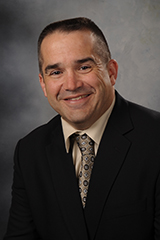April 7, 2020
COVID-19 Week 4: Face Masks and Rural vs Urban

As we enter week 4 of our COVID-19 work protocols, I want to thank everyone, once again, for all of the extra effort we are doing as we continue to serve the people of Kansas. You are staying abreast of our communications. You are also trying new ways (digital extension techniques) and old ways (calling people on the telephone) to see how the people you serve are doing, what educational needs they might have, and delivering on those needs in ways that comply to our no face-to-face contact and strict social distancing protocols.
The Center for Disease Control (CDC) put forward a recommendation encouraging people to wear cloth face masks in public. The general population should use cloth masks leaving all of the badly needed N95 respirators and surgical masks for use by our healthcare industry. Essentially, they just want our nose and mouth to be covered with a cloth device. Our Extension professionals still working in open physical offices should consider covering their face with some sort of cloth mask, even while maintaining safe social distancing. Our internal COVID-19 webpage has a CDC published guide for making your own face masks. Our internal COVID-19 webpage can be found at https://www.ksre.k-state.edu/employee_resources/covid-19/covid19.html.
On another but related matter, there are some who believe that rural county residents are less vulnerable to COVID-19. This is a false sense of security. While it is true that social distancing is more easily practiced in lower populated rural areas, almost all of us are dependent on some sort of interaction with people (and any contagious health issue they may have) to receive the goods and services we cannot produce ourselves and to sell the goods and services we do produce ourselves. Thus, COVID-19 is non-discriminatory. It isn’t an urban thing or a rural thing. It is an everybody and everywhere thing.
Additionally, as Shannon Monnat points out in the Syracuse University’s Lerner Center for Health Promotion Issue Brief, Why Coronavirus Could Hit Rural Areas Harder (Issue Number 16; March 24,2020), rural areas tend to be characterized by an older population, a higher incidence of chronic health conditions, and fewer healthcare opportunities. All of these characteristics represent problematic compounding factors when dealing with our COVID-19 challenge. If you would like to read this Issue Brief or share it with your Extension Board or other public officials, it can also found at our internal COVID-19 webpage.
We are all susceptible to this pandemic, and we all need to do our part in resisting, containing, and fighting it. We will continue our fight by educating the public, using non face-to-face instructional and communication methods, and practicing social distancing and donning face masks when human interaction is unavoidable.
You all are doing great! Let’s keep up the fight!